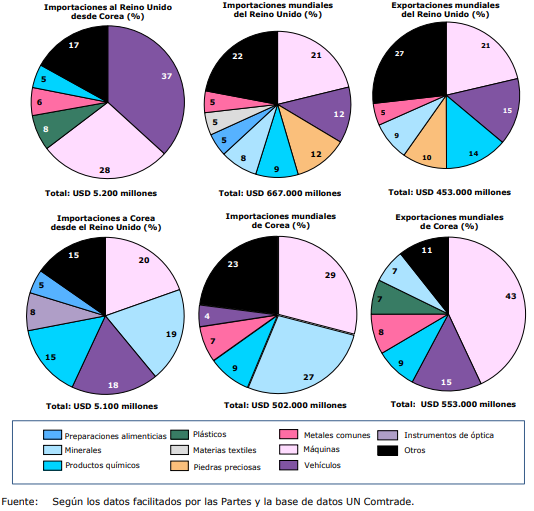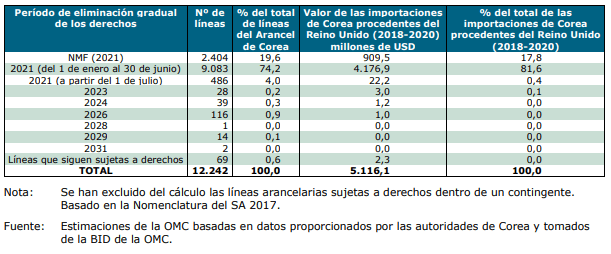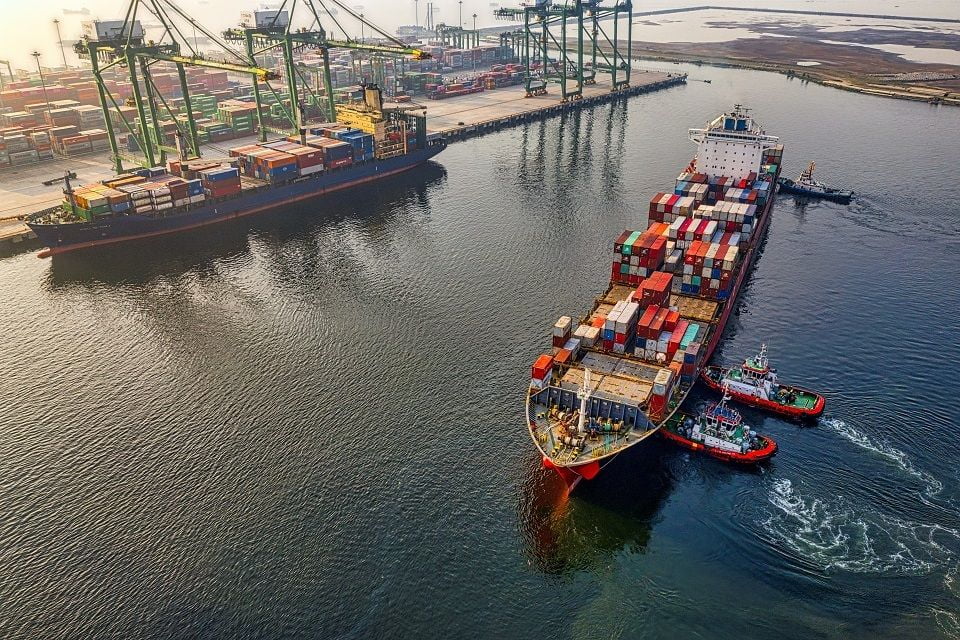The WTO published an analysis of the Free Trade Agreement between the UK and South Korea, two economies with high integration to global value chains.
Over the 2018-2021 period, UK imports from South Korea were less diversified than its global imports, with vehicles and machines accounting for almost two-thirds of UK merchandise imports from Korea.
In the case of South Korea, these same products were the main export products and accounted for respectively 15 and 43% of its exports.
The bilateral and global product structure of Korea’s imports is relatively similar.
Also, the top four products imported by Korea from the United Kingdom were machinery, minerals, vehicles and chemicals, which accounted for 15-20% of bilateral imports.
Free Trade Agreement
Machines, vehicles and chemicals were also the UK’s top global exports, accounting for 21%, 15% and 14%, respectively, of global exports.
Corea-Reino Unido: Composición del comercio de mercancías por productos y por Sección del SA, promedio anual (2018-2020).
In 2020, and excluding intra-EU trade, South Korea was the world’s ninth largest exporter and importer of commercial services, while the United Kingdom was the world’s third largest exporter and fourth largest importer of such services.
Korea’s share of commercial services trade accounted for 1.8% of world exports (valued at $86 billion) and 2.2% of world imports ($102 billion).
The United Kingdom’s share was 6.9% of world exports ($339 billion) and 4.4% of world imports ($201 billion).
Both imports and exports with the rest of the world declined during the period; imports declined more rapidly, resulting in a reduction in Korea’s world trade deficit.
There have been no major changes in the sectoral composition of Korea’s services exports and imports.
Transportation services, other business services, and travel-related services accounted for about 66% of total exports and 69% of total imports in 2020.
Tariffs
In 2021, 19.6% of Korea’s tariff lines were MFN duty-free, corresponding to 17.8% of imports from the United Kingdom during 2018-2020.
At the beginning of 2021, 74.2% of Korea’s Tariff (81.6% of imports) was already duty-free for products originating from the UK as a result of the liberalization provided for in the EU-Korea Agreement.
On July 1, 2021, an additional 486 lines became duty-free under the Agreement.
Most of the lines subject to duty will be eliminated in different stages, so that by the end of the implementation period in 2031, only 69 lines will remain subject to duty.
Corea: Compromisos de eliminación de aranceles en el marco del Acuerdo y promedio de los valores comerciales correspondientes.
In 2021, 47% of the UK’s tariff lines were MFN duty-free, which corresponded to 47.1% of its imports from Korea over the 2018-2020 period.
At the beginning of 2021, 52.6% of the UK Tariff (52.9% of imports) was already duty-free for products originating from Korea as a result of the liberalization provided for in the EU-Korea Agreement.
At the end of the implementation period, 36 lines remained subject to duty.
Reino Unido: Compromisos de eliminación de aranceles en el marco del Acuerdo y promedio de los valores comerciales correspondientes.
![]()

